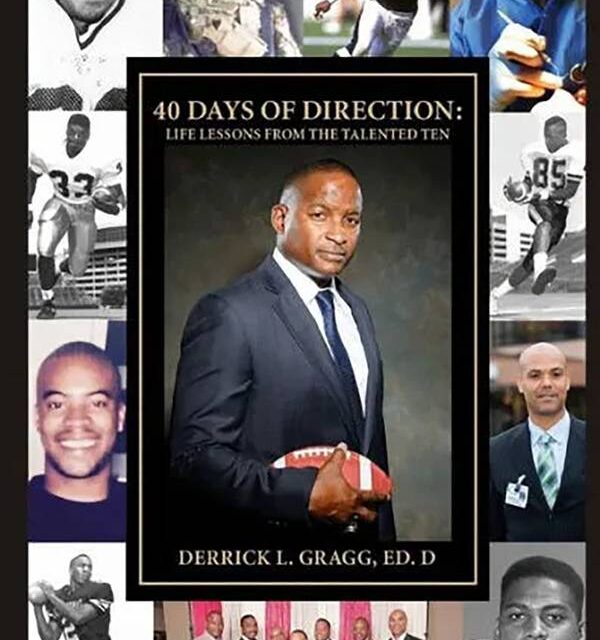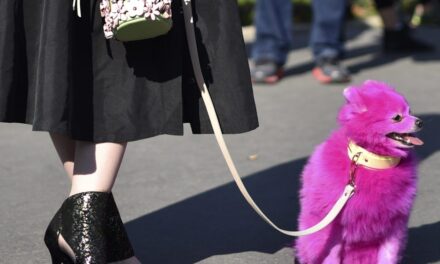Northwestern University Athletic Director Derrick Gragg, whose leadership has been under scrutiny in the wake of the school’s recent hazing scandal, published a book in 2015 offering advice to male college athletes that includes several questionable passages concerning interaction with and the treatment of women.
Gragg’s book, “40 Days of Direction: Life Lessons from the Talented Ten,” is billed as a blueprint “not only for young men who seek to become college athletes, but for all young men who aspire to become successful,” according to the cover. While most of the writing covers guidance like prioritizing academics and avoiding trouble, two chapters that focus on relationships with women stand out as markedly different in tone and language.
In his book, Gragg — who overseas both women’s and men’s sports in his role as Northwestern’s athletic director — calls women “man’s greatest distraction,” criticizes the portrayal of women in music videos as “booty-shaking sex-kittens,” and provides his take on serious crimes like rape and sexual assault.
Gragg said in an email to the Tribune that he wrote the book as a reflection of his own experiences as a young Black man “fulfilling my dream” of playing Division I football.
“The audience I was speaking to was primarily young men in similar circumstances who are looking for role models as they pursue their own dreams both as college athletes and in life,” he said. “One of the most important lessons that I sought to convey to my young, male readers is that all women should be treated with respect at all times. This is a belief I have sought to champion in both my personal life and throughout my entire career — including in my most recent position overseeing inclusion across the entire NCAA.”
Northwestern media officials also did not immediately respond to Tribune questions about the book and whether these passages and rhetoric reflect the views and perspectives of the university.
In a chapter titled “Remember, She is Someone’s Daughter,” Gragg discusses serious crimes like sexual assault and rape.
“I know it can be difficult to be a gentleman at all times,” he writes. “We usually have only seconds to make some of the most important decisions that can ultimately change the way our lives turn out. I know it’s tough. The alcohol is flowing, she is feeling you and you are definitely feeling her. This is why it is critical for you to think with your brain and not your physical emotions or feelings during these times.”
He goes on to examine how these “situations” affect the lives of male college athletes.
“There have been many situations where athletes, fraternity members and other male students have found themselves caught up in very serious situations involving women, including sexual assault, violence and rape,” Gragg writes. “Recently, several football and basketball student athletes at big-time programs have been accused of violent crimes against women such as rape and assault. They have been thrown off their teams and out of college and ultimately may end up in prison for many years. Just imagine how much these athletes’ lives have changed in a few months, from running out of the locker room to the sound of thousands of fans, to the unthinkable life that prison may bring. I’m sure that they would do anything to change the circumstances and would not be anywhere close to the young ladies involved. But, unfortunately, life doesn’t happen like that.”
Earlier in that chapter, Gragg decries the portrayal of women — particularly women of color — on reality television and music videos, yet the language seems to evoke sexist tropes and problematic stereotypes.
[ What is Athletic Director Derrick Gragg’s role in this tumultuous period for Northwestern athletics? ]
“I often feel sorry for those women, despite the fact that they are making a profit from selling out in front of thousands, even millions, of people who watch the shows each week,” he writes. “There is nothing worse than seeing a beautiful, intelligent woman disrespect herself and those around her. All you have to do is turn on a hip-hop music video or one of the several awful reality television shows to see women degrading themselves shaking it for cameras and audiences. Music videos portray women as booty-shaking sex-kittens or materialistic gold-diggers. Many of those women simply do not seem to have a sense of self and who they really are or where they come from at all. However, regardless of what you see or hear, there are very good, upwardly mobile, smart women out there. You probably encounter them every day at school or in the community.”
Gragg goes on to tell readers to always be respectful “even when you encounter a female who seems to disrespect herself,” because “no matter how a woman may look on the outside, she is someone’s daughter.”
Another chapter is titled “Women: Our Greatest Distraction.”
While Gragg praises the positive women in his life, from his mother to his wife to his daughter, he goes on to write, “I love all the women in my life, but I have found that maintaining my relationships with them can be more than challenging.”
“Therefore, I do not think that I am overstating things or exaggerating when I say that a female is often a man’s greatest distraction,” that passage concludes.
Gragg continues to caution student athletes against being “players” and “collecting women,” in part due to dissonance between the sexes.
“The first rule for guys to remember is that even though we may pretend to be all-knowing about the opposite sex, we really don’t know much about women at all,” he writes. “Even Steve Harvey, famed comedian, television star and author who has written two popular books about male-female relationships, says he is no expert on women. Quite honestly, I don’t think that any man is an actual expert on women. So give it up, men, you are NOT going to EVER figure out what makes a woman tick completely. You may come close at some point after several experiences and relationships, but you won’t figure them out while you’re 20 years old and probably not when you’re 30 or 40 either.”
He adds that “too many distractions can definitely affect your performance on the field or court, and not in a good way.”
“Again, I am definitely not being negative toward women,” he writes. “I’m just trying to give the guys reading this the guidance and at least a chance to choose to limit their distractions.”
Gragg — the first Black athletic director at the university — has been in the spotlight recently as he leads during a particularly turbulent period in the athletic department’s history.
Earlier this month, university President Michael Schill fired head football coach Pat Fitzgerald in response to a hazing scandal that Schill described in a statement as “systemic dating back many years.”
“The hazing included forced participation, nudity and sexualized acts of a degrading nature, in clear violation of Northwestern policies and values,” Schill’s statement said.
A few days later, Northwestern head baseball coach Jim Foster — who had been hired by Gragg — was fired amid allegations of abusive behavior and creating a toxic culture.
“This has been an ongoing situation and many factors were considered before reaching this resolution,” Gragg had said, in a statement. “As the Director of Athletics, I take ownership of our head coaching hires and we will share our next steps as they unfold.”
Current and former baseball players, alumni and those close to the baseball program had told the Tribune that they alerted university administration, including Schill and Gragg, about concerning behavior from Foster going back to last fall, before the start of the 2023 season; some of those complaints ignited a human resources investigation, which found sufficient evidence that Foster “engaged in bullying and abusive behavior.”
In an interview with The Daily Northwestern, Schill on Monday affirmed his support for Gragg as the athletic director.
In a question-and-answer session, the student newspaper said it received feedback from readers “who say that Gragg should no longer be at the University for his handling of this situation,” referencing the football hazing scandal and its fallout.
“I am supporting him, I am meeting with him about the prospective steps, but there is no process, conversation or discussion of his employment status,” Schill responded. “He is the athletic director.”
In the email to the Tribune, Gragg added that as Northwestern’s athletic director, “I am proud to work alongside my fantastic colleagues to support and celebrate the roughly 500 men and women from diverse backgrounds who wear a Wildcat jersey.”
Former players have recently filed several lawsuits against the university, claiming that rampant hazing and a toxic environment pervaded multiple sports. Lawyers say a former Northwestern volleyball player is accusing the university of long-standing problems on the volleyball team, including hazing, bullying, humiliation and retaliation; the woman, identified anonymously as Jane Doe 1, is the first female athlete to make such allegations against the prestigious Big Ten school amid the hazing scandal, according to a lawsuit that’s pending.
Northwestern has responded with a statement acknowledging that a student had made an allegation of hazing on the volleyball team in March 2021, prior to the tenure of Gragg and Schill.
“The University responded by conducting an investigation, during which it suspended the team’s coach and coaching staff,” the statement said. “The investigation confirmed that hazing had taken place. Appropriate disciplinary action was taken. Among other actions, the University canceled two games and implemented mandatory anti-hazing training.”
Much of Gragg’s advice and guidance in the book “40 Days of Direction” stems from his experience playing football for Vanderbilt University, where he went on to serve as director of student life in the athletic department in the 1990s.
Chicago Tribune Sports
Weekdays
A daily sports newsletter delivered to your inbox for your morning commute.
He has also worked as director of athletics at the University of Tulsa and Eastern Michigan University, and had led compliance departments at the University of Michigan and University of Missouri.
Before his hire as Northwestern’s athletic director in summer 2021, Gragg served at the NCAA as senior vice president for inclusion, education and community engagement.
Northwestern had asked Gragg to interview for the athletic director position earlier, but he initially turned down the opportunity. Instead, the university had hired former deputy athletic director Mike Polisky — one of four defendants named in a sexual harassment lawsuit filed by a Northwestern cheerleader.
Polisky, whose hire drew protests from faculty and community members, resigned just days later.
That lawsuit, which is still pending, claimed the cheerleader was routinely groped and harassed by drunk fans, and older men would grab her breasts and buttocks over her uniform. The cheerleader lawsuit also alleged the head coach required cheerleaders to mingle with wealthy donors to help the school’s finances.
“(The) cheerleaders were being presented as sex objects to titillate the men that funded the majority of Northwestern’s athletics programs,” the lawsuit said. “After all, the happier these men were, the more money the university would receive from them.”




